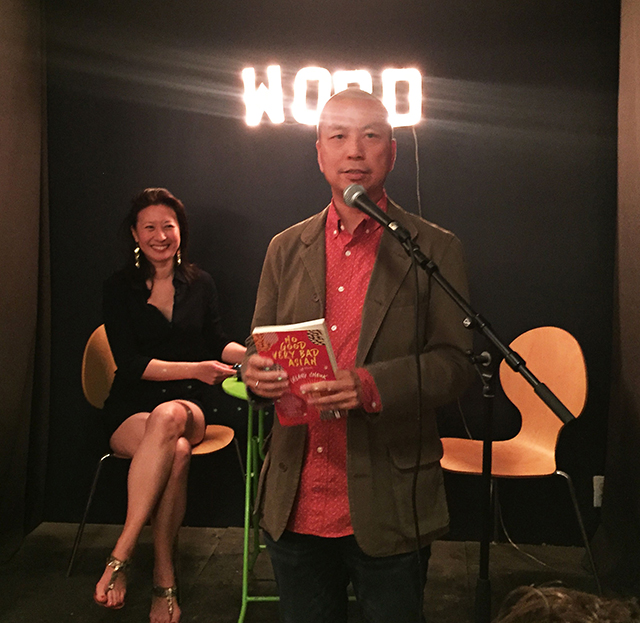
Leland Cheuk discussed his new novel No Good Very Bad Asian at WORD Bookstore in Brooklyn. He was joined by Cheryl Lu-Lien Tan to discuss the novel, and the comedians Wilson McDermut, Cindee Weiss, and Angela Cobb, who Cheuk met while learning to perform standup comedy as part of his research into writing the book.
No Good Very Bad Asian follows the story of Sirius Lee, a Chinese American comedian fighting against the expectations people around him have in pursuit of his true love, comedy.
Following performances by the three comics, Cheuk and Tan sat down to discuss the novel.
“The conception of the book was to write against the minority stereotype,” Cheuk said. A fan of standup comedy, Cheuk saw it as an access point to confront stereotypes and to explore identity.
In researching the book, Cheuk performed his own standup routines and took classes to learn the art. After completing his previous novel, he wanted to consume different forms of creative expression as a way of recharging his own creativity. “Your first novel tends to be autobiographical,” he explained, “experiencing what it was like to be on stage was a way for me to fire up again and get excited about the book.”
Cheuk says that the first thing comedians have to do is joke about the way they look to win over the audience. He had written a joke about his Asian heritage, but included it in the middle of his routine. His teacher instructed him to move it to the front of the lineup because audiences would be waiting for him to discuss himself. By placing it near the beginning, audiences would be on his side and hoping for him to succeed.
The standup performances were critical to the book because a lot of the things that come out in the book were things he learned in the clubs and being on the road doing standup.
Often Cheuk mashes up pieces from his life for a partial truth. One example of this is the use of setting, borrowing a location where his wife was from because of his own familiarity with it through her. The result isn’t an autobiographical account, but he relies on his familiarity to construct a scene.
“I wanted to write about character with a very different background than my own,” he said, acknowledging that he grew up with a lot of privilege.
“I’m a comedy nerd,” he confesses, and then explains how comedy is often very different around the world. A Scottish comedian once told him that American comedians all have the same, self-referential jokes, for example.
He spent eight years working on the book. However, most of the jokes and humor came out in the earlier drafts. He says often the hardest part is knowing when not to be funny, and choosing when to be serious. Taking out a joke out of the manuscript can be the hardest part of writing a funny book.
Another challenge writers face is dealing with family who might be inspirations for elements of the book, or who see themselves in the writing. His parents often ask him why he writers about parents and parent relationships. Cheuk jokes he’s lucky because his mother doesn’t read English. But ultimately writers can’t hold back.
“I’m ruthless. Writers have to be ruthless.”